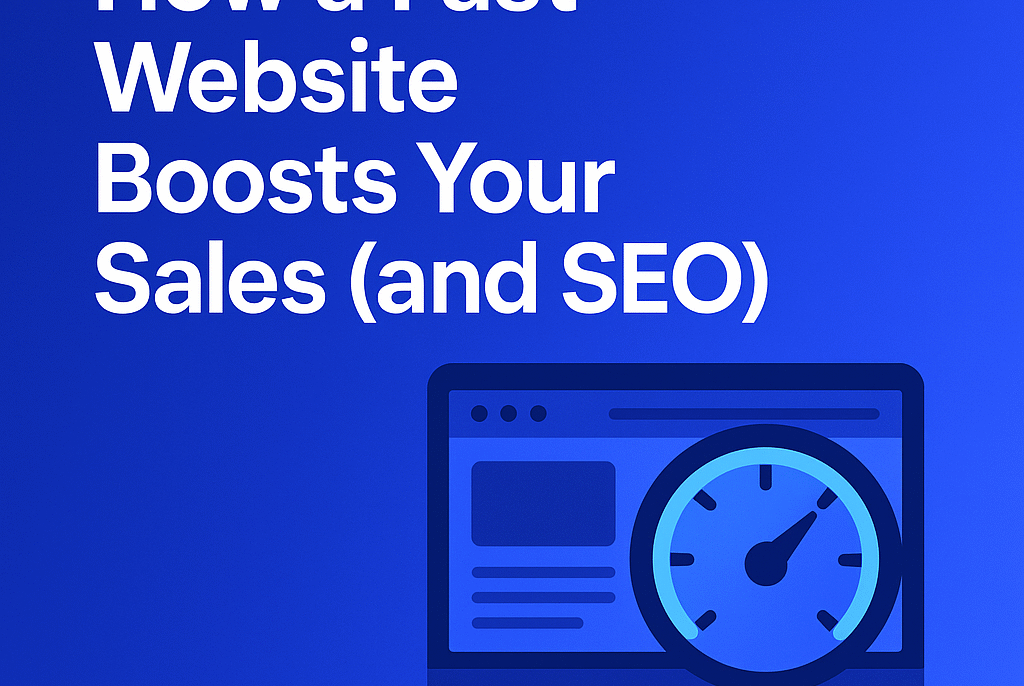In today’s digital-first world, users expect instant results. A few seconds of delay can cost you a sale, a client, or a lead. Speed isn’t just a nice-to-have—it’s a make-or-break factor for your online presence. In this post, we’ll explore how website speed affects SEO, user experience, and—ultimately—your bottom line.
- Why Website Speed MattersThink of your website as your digital storefront. Just like no one wants to wait in a long checkout line, no one wants to wait for a slow site to load. Studies show:
1 in 4 users abandon a site that takes more than 4 seconds to load.
Every 1-second delay can reduce conversions by up to 7%.
40% of users won’t return to a slow site.
Your website’s loading time influences how users perceive your professionalism and credibility. - How Speed Affects SEOGoogle uses site speed as a ranking factor. Here’s how it plays a role:
Core Web Vitals: Google evaluates your page’s Largest Contentful Paint (LCP), First Input Delay (FID), and Cumulative Layout Shift (CLS).
Crawl Efficiency: The faster your site loads, the more of it Google can crawl in one session.
Bounce Rates: Slow sites cause higher bounce rates, signaling poor user experience.
A fast-loading site improves crawlability, indexing, and keeps users engaged longer. - Website Speed & Sales: The Direct LinkSpeed isn’t just a tech concern—it’s a business driver. A fast website:
Improves the user journey from landing to checkout
Builds trust with customers
Increases engagement and time on site
Reduces cart abandonment
Example: Walmart found that every 1-second improvement in page load time increased conversions by 2%. - What Slows Down a WebsiteMany business owners don’t realize their site’s performance is suffering. Common culprits include:
Large, uncompressed images
Cheap or overloaded hosting
Bloated themes and plugins
Unminified CSS and JavaScript
No caching strategy
Each of these can be addressed in a site redesign or audit. - How to Speed Up Your WebsiteBoosting your website’s speed doesn’t require a full rebuild. Start with these steps:
Use a performance host: Providers like SiteGround, Cloudways, and Kinsta offer faster load times.
Install a caching plugin: WP Rocket or W3 Total Cache are top choices for WordPress.
Optimize images: Use WebP format and tools like TinyPNG or ShortPixel.
Minify your code: Reduce file size of CSS, JavaScript, and HTML.
Enable lazy loading: Load images only when needed to speed up initial page render.
Use a CDN: Content Delivery Networks like Cloudflare serve assets faster around the globe. - Tools to Measure Your Website SpeedBefore you optimize, you need to know where you stand. These tools offer insights and suggestions:
Google PageSpeed Insights
GTmetrix
Pingdom Tools
WebPageTest
Check both mobile and desktop performance, and aim for a loading time under 2 seconds. - Mobile-First Means Speed-FirstMobile users are even more sensitive to slow load times. With Google’s mobile-first indexing, your mobile speed has a direct effect on your overall SEO and user engagement. A fast mobile site is now essential.
- Speed as a Competitive AdvantageFast websites don’t just survive—they win. When your competitor’s site is slow, your lightning-fast experience gives you the edge. Customers notice, and Google rewards you for it.
- Redesign vs. Optimization: What You NeedNot sure whether you need a full redesign or just performance tweaks? If your site is modern but slow, optimization may be enough. But if it’s outdated, unresponsive, or cluttered, a redesign can fix speed and improve UX, SEO, and conversions at once.
Conclusion: Don’t Let Speed Slow You DownSpeed equals success online. If your website loads slowly, it’s costing you traffic, rankings, and revenue. Whether through optimization or a strategic redesign, improving your website speed is one of the smartest business moves you can make.
📩 Ready to upgrade your site speed? Contact me now or explore my web design services.
FAQsQ: How fast should my website load?A: Ideally under 2 seconds, with Google recommending under 3 for good UX.
Q: What’s the best way to improve WordPress site speed?A: Use a quality host, caching, image optimization, and minimal plugins.
Q: Will speeding up my site really help SEO?A: Yes. Speed affects rankings, crawlability, and bounce rate—all critical SEO metrics.

